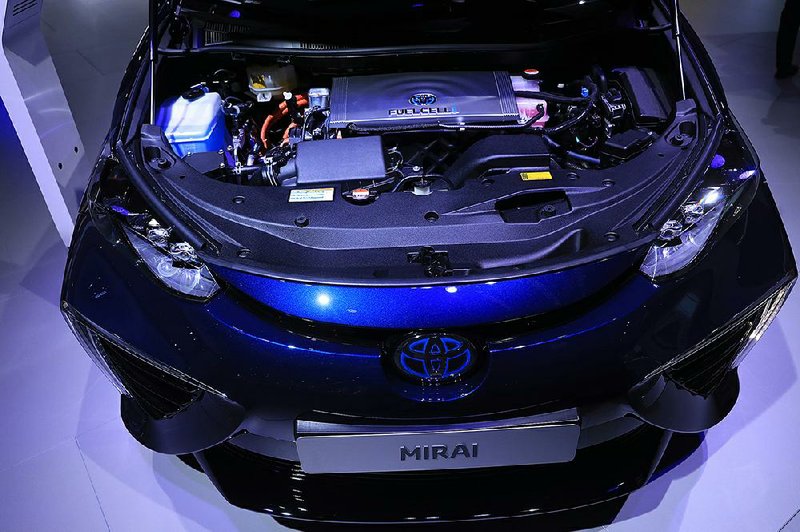Toyota Motor Corp., which has made a big bet on hydrogen-powered cars, is looking more isolated as industry rivals continue their on plug-in electric vehicles as the dominant technology in the emerging post-fossil fuel era.
Three years ago, Toyota President Akio Toyoda, grandson of company founder Kiichiro Toyoda, unveiled the Mirai, a four-door family sedan powered by hydrogen tanks and fuel-cell technology that emits nothing but heat and water -- and none of the gases that contribute to global warming.
However sales of the $57,500 sedan -- available in Japan, California, and parts of Europe -- have yet to break the 5,000 mark, compared to some 300,000 of Nissan Motor Co.'s battery-electric Leaf.
Toyota isn't the only player in fuel-cell vehicle development. However, even hydrogen-car backers such as Honda Motor Co., Hyundai Motor Co. and Volkswagen AG's Audi have refocused their zero-emissions car strategies on electronic vehicles. Investment in hydrogen power stations has been glacial and technology advances have lowered the cost of batteries and extended driving ranges.
China, the world's biggest car market, nearly doubled the number of charging points last year to 215,000, while the number of hydrogen stations was all of five. It plans to introduce a cap-and-trade emissions policy from 2019, and has joined a growing list of countries seeking deadlines to phase out fossil fuel-powered vehicles.
Tesla Inc. this month unveiled a new Roadster with a 620-mile driving range, twice that of Toyota's Mirai. The electric carmaker's CEO, Elon Musk, has long disparaged fuel cells because of the cost and difficulty of creating, storing and transporting hydrogen.
By contrast, the relative simplicity of EV powertrains has helped open the door to a host of new entrants, including vacuum-cleaner billionaire James Dyson. Bloomberg New Energy Finance sees electric cars reaching price parity with their gasoline-burning cousins as early as 2025, following a 73 percent plunge in lithium-ion battery prices between 2010 and 2016.
"It's easier for companies to make a profit with EV, and it's easier for governments to prepare the infrastructure," said Richard Kaye, a portfolio manager at Nippon Comgest Inc. "For the past few years, it's been EV that's been gaining traction. Because of that, it's EV that's much closer to becoming reality."
As such, fuel-cell technology is increasingly being put on the back burner. Honda CEO Takahiro Hachigo said last month he thinks EVs will proliferate faster in the near term, and Hyundai Executive Vice President Lee Kwang-guk said in August that EVs will now be the "mainstay" of the Korean automaker's eco-car lineup.
Fuel cells were barely a footnote when VW CEO Matthias Mueller announced the group's aggressive electrification strategy in September.
By contrast, Toyota says its fervor for the technology it began developing in the early 1990s remains undiminished. Fuel-cell and battery-electric vehicles must be developed "at the same speed" because different parts of the world will favor different energy sources based on their specific needs, Executive Vice President Didier Leroy said at last month's Tokyo Motor Show, where Toyota was the only Japanese automaker to display hydrogen-powered vehicles.
"We know, for example, that the fuel cells in the Japanese society will be much more than just cars," Leroy said. "In many other places in the world, it will be the same."
California is currently the main market for fuel-cell vehicles outside Japan, but has just 30 hydrogen stations. Efforts by Toyota and its partners to set up infrastructure on America's East Coast have been plagued by delays. By contrast, BNEF counted more than 44,000 charging points nationwide in 2016.
Japan has 91 hydrogen stations and is aiming for 160 by 2020 and 320 by 2025. But that's against more than 28,000 charging points at the end of last year, according to BNEF, whose analysts forecast the high costs and strict regulations governing hydrogen stations will mean the government can only meet 75 percent of its 2020 goal, and an even smaller proportion of its 2025 target.
"Unlike lithium-ion batteries for electric vehicles, there is no existing parallel industry for fuel cells that accelerates the speed of cost reduction," said BNEF analyst Ali Izadi-Najafabadi. "Fuel-cell vehicles will not achieve the same level of market penetration."
The gap is widening even as Toyota forges partnerships aimed at promoting fuel cells. One such global entity established at the start of this year, the Hydrogen Council, said this month that the lightest element could supply a fifth of worldwide energy needs by 2025.
-- Information for this article was contributed by Dana Hull of Bloomberg News.
SundayMonday Business on 12/03/2017
